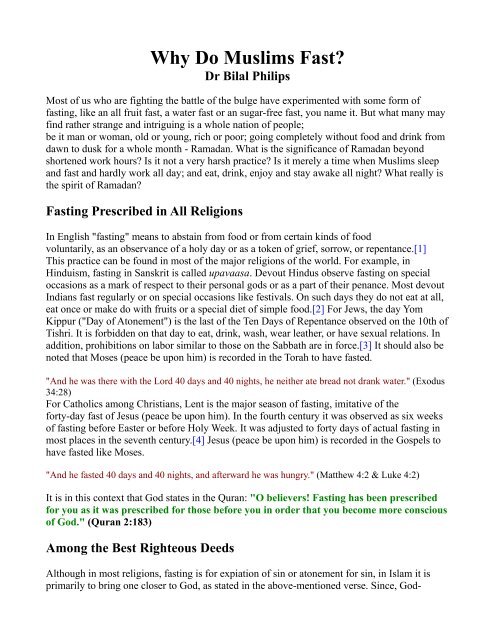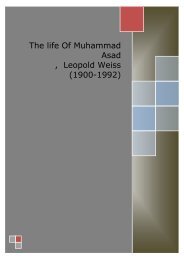You also want an ePaper? Increase the reach of your titles
YUMPU automatically turns print PDFs into web optimized ePapers that Google loves.
<strong>Why</strong> <strong>Do</strong> <strong>Muslims</strong> <strong>Fast</strong>?<br />
Dr Bilal Philips<br />
Most of us who are fighting the battle of the bulge have experimented with some form of<br />
fasting, like an all fruit fast, a water fast or an sugar-free fast, you name it. But what many may<br />
find rather strange and intriguing is a whole nation of people;<br />
be it man or woman, old or young, rich or poor; going completely without food and drink from<br />
dawn to dusk for a whole month - Ramadan. What is the significance of Ramadan beyond<br />
shortened work hours? Is it not a very harsh practice? Is it merely a time when <strong>Muslims</strong> sleep<br />
and fast and hardly work all day; and eat, drink, enjoy and stay awake all night? What really is<br />
the spirit of Ramadan?<br />
<strong>Fast</strong>ing Prescribed in All Religions<br />
In English "fasting" means to abstain from food or from certain kinds of food<br />
voluntarily, as an observance of a holy day or as a token of grief, sorrow, or repentance.[1]<br />
This practice can be found in most of the major religions of the world. For example, in<br />
Hinduism, fasting in Sanskrit is called upavaasa. Devout Hindus observe fasting on special<br />
occasions as a mark of respect to their personal gods or as a part of their penance. Most devout<br />
Indians fast regularly or on special occasions like festivals. On such days they do not eat at all,<br />
eat once or make do with fruits or a special diet of simple food.[2] For Jews, the day Yom<br />
Kippur ("Day of Atonement") is the last of the Ten Days of Repentance observed on the 10th of<br />
Tishri. It is forbidden on that day to eat, drink, wash, wear leather, or have sexual relations. In<br />
addition, prohibitions on labor similar to those on the Sabbath are in force.[3] It should also be<br />
noted that Moses (peace be upon him) is recorded in the Torah to have fasted.<br />
"And he was there with the Lord 40 days and 40 nights, he neither ate bread not drank water." (Exodus<br />
34:28)<br />
For Catholics among Christians, Lent is the major season of fasting, imitative of the<br />
forty-day fast of Jesus (peace be upon him). In the fourth century it was observed as six weeks<br />
of fasting before Easter or before Holy Week. It was adjusted to forty days of actual fasting in<br />
most places in the seventh century.[4] Jesus (peace be upon him) is recorded in the Gospels to<br />
have fasted like Moses.<br />
"And he fasted 40 days and 40 nights, and afterward he was hungry." (Matthew 4:2 & Luke 4:2)<br />
It is in this context that God states in the Quran: "O believers! <strong>Fast</strong>ing has been prescribed<br />
for you as it was prescribed for those before you in order that you become more conscious<br />
of God." (Quran 2:183)<br />
Among the Best Righteous Deeds<br />
Although in most religions, fasting is for expiation of sin or atonement for sin, in Islam it is<br />
primarily to bring one closer to God, as stated in the above-mentioned verse. Since, God-




